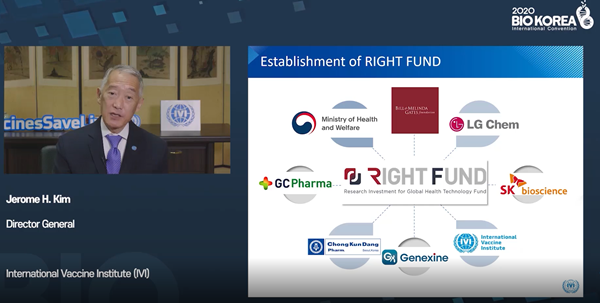With the world’s collaboration to fight the new coronavirus pandemic, researchers have successfully entered clinical trials on a Covid-19 vaccine in just four months, an expert said in an online biotech conference. He noted that the speed of the vaccine development is unprecedentedly fast.
Jerome Kim, director-general of International Vaccine Institute, said so during his keynote speech at the virtual meeting of Bio Korea 2020 on Monday.

According to Kim, it usually takes about five to 10 years to develop a vaccine under normal circumstances. However, the outbreak of the unknown Covid-19 virus “under extraordinary circumstances” has shortened the expected vaccine development period to six to 18 months.
Such rapid development was possible thanks to the contribution by the Coalition for Epidemic Preparedness Innovations (CEPI), an organization established in 2017 to finance research projects to develop vaccines against emerging infectious diseases.
CEPI was founded after the Ebola outbreak hit the western part of Africa in 2014. Pharmaceutical firms have invested a massive amount of money in developing a vaccine against the Ebola virus but failed to complete the development during the Ebola outbreak.
Kim noted that the Ebola outbreak made it clear that it was impossible to develop a vaccine during an outbreak of a disease. To solve such a problem, CEPI was formed. The organization prepared for “Disease X,” an outbreak of an unknown disease, Kim said.
Fortunately, “the Covid-19 fit the pattern for Disease X,” and CEPI could release a proposal for a vaccine clinical trial in just four months after Covid-19 hit China hard in January, he added.
According to Kim, four groups -- Moderna, Inovio, CureVac, the University of Queensland -- received the initial CEPI funding for research on the Covid-19 vaccine. Two of them have entered phase-2 clinical testing to check if the candidates can show appropriate immune, protective responses against Covid-19.
“So, in four months, they’ve gone from nothing to being in the phase of vaccine testing,” Kim said. “An amazing tribute to an organization that didn’t exist until 2017, but it stepped forward as a global solution to a problem that threatens us all.”
He also introduced a variety of international collaboration efforts amid the Covid-19 crisis, including the WHO’s Solidarity Project. The project tests potential Covid-19 drugs simultaneously and compares various vaccine candidates to prepare a phase-3 trial. To speed up the progress, the WHO’s project helps pharmaceutical firms quickly grasp the needs of drug regulatory agencies in each country.
In Korea, the Research Investment for Global Health Technology (RIGHT) Fund is playing a similar role. The organization is a public-private partnership fund, jointly invested by the Bill and Melinda Gates Foundation, the Korean government, and five drugmakers (LG Chem, GC Pharma, SK Bioscience, Chong Kun Dang, and Genexine).
In a fight against a pandemic, the speed is crucial. Still, it is also critical to evaluate the safety and efficacy, Kim emphasized.
For a quicker start of clinical trials, companies are using their accumulated data. Inovio’s DNA vaccine was used as a vaccine against the Middle East Respiratory Syndrome virus and Zika virus and the company could prove its safety, which helped the FDA to exempt the drug from animal toxicity testing, Kim explained.
A Covid-19 vaccine will not only save lives but bring many indirect effects, he said.
Indirect effects of Covid-19 vaccination will include healthier families, improved cognitive and physical development, and improved economic growth, he added.

